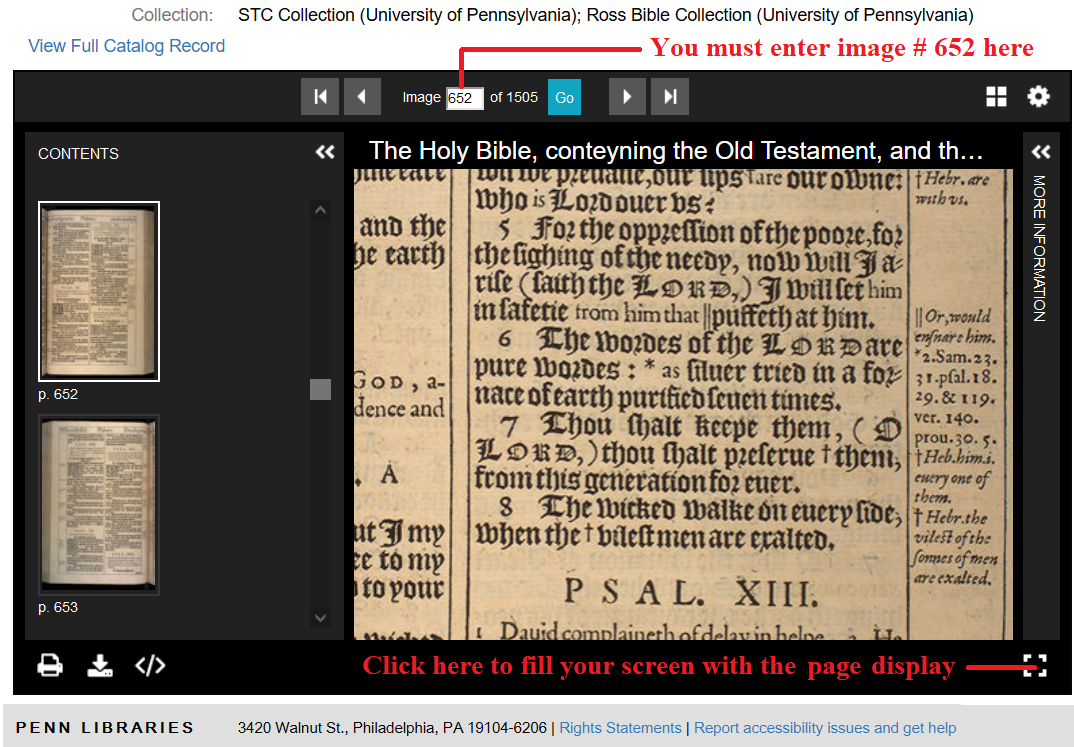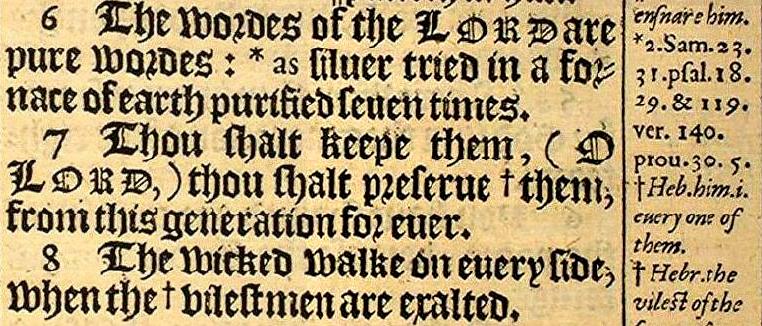| |
For an excellent sermon on how these words of
David can still be applied in our lives today, listen to this sermon by Austin Duncan
(War of the Words) (who has no need to even mention the topic of our page here).
The following are a few other reliable Bible
translations which may help shed more light on this passage:
[5] “Because of the devastation of the afflicted, because of the groaning of the needy, Now I
will arise,” says the LORD; “I will set him in the safety for which he longs.” [6]
The words of the LORD are pure words; As silver tried in a furnace on the earth, refined seven times.
[7] You, O LORD, will keep them; You will preserve him from this generation forever. [8]
The wicked strut about on every side When vileness is exalted among the sons of men. (Psalm 12:5-8; New
American Standard Version, 1995; or NAU)
[5] “Because the poor are plundered, because the needy groan, I will now arise,” says the
LORD; “I will place him in the safety for which he longs.” [6] The words of the LORD are pure
words, like silver refined in a furnace on the ground, purified seven times. [7] You, O LORD, will keep
them; you will guard us from this generation forever. [8] On every side the wicked prowl, as vileness
is exalted among the children of man. (Psalm 12:5-8; ESV)
[5] “Because of the violence done to the oppressed, because of the
painful cries of the needy, I will spring into action,” says the LORD. “I will provide the safety
they so desperately desire.” [6] The LORD's words are absolutely reliable. They are as untainted as
silver purified in a furnace on the ground, where it is thoroughly refined. [7] You, LORD, will protect
them;* you will continually shelter each one from these evil people,
[8] for the wicked seem to be everywhere, when people promote evil. (Psalm 12:5-8; NET Bible)
The NET Bible also contains numerous "translation notes"; the following being only one example from the
passage above:
* The third person plural pronominal suffix on
the verb is masculine, referring back to the “oppressed” and “needy” in v. 5 (both of those
nouns are plural in form), suggesting that the verb means “protect” here. The suffix does not refer to
אִֽמֲרֹ֣ות (’imarot,
“words”) in v. 6, because that term is feminine gender.
Hopefully our readers will see the importance of having such notes in their Bibles.3
_______________
1 [Return to Text] Even though this evidence has been
available for many decades in facsimile reprints (exact copies of 1611 Bible editions) and even
more readily available from many sites on the Internet, some 'preachers' still refuse to recant
their erroneous view of this passage. Instead, they revert to arguments that require an impossible
stretch in basic English grammar: They complain this marginal note is attached only to the
second "them" in verse 7 ("preserve †them") and not to the first ("keepe them"), giving up on the major phrase in the verse that
concerns "perservation" in some kind of "last ditch effort" to hang onto
their own concept of how God carried out the promise that His Word will last forever!
I personally trust that God "keeps [His words]" too; as should any Believer
who reads Isaiah 40:8 ("But the word of our God stands forever.") and many of
the verses in Psalm 119 which express the same thought.
However, there's only one way
those 'preachers' can still cling to their view that this passage
somehow has anything to do with a particular translation of the Bible:
They must twist the straightforward understanding of this verse by
attempting to force the last phrase, "from this generation for ever"
to connect with "Thou shalt keep them" (though it says nothing about
translated words at all), without ever explaining why the Spirit would
confusingly (if they were correct) bring up a completely different subject in
an intervening phrase before finishing a short thought that grammatically
cries out for there to be nothing in between! We could also add that later
corrected editions (such as Blayney's 1769 edition; often considered
to be the real KJV Bible by these 'preachers'), do not have a comma after
the second "them"; showing that all later editors understood
"preserve them" as obviously being connected to what follows
("from this generation for ever").
Some Insight into the Hebrew Text from the King's Translators
So what was the basis for the King's Translators noting
the word they translated as "them" was actually "him"
in the Hebrew Text? If you open any Hebrew Interlinear Bible to Psalm 12 (verse 8
in the Hebrew Text), you'll eventually discover that word ("him") is only part
of a single Hebrew word they translated as "thou shalt preserve them"; which
comes from the verb to keep, guard against danger or preserve (Strong's
#05341 root: natsar). For the purposes of this study, we recommend looking
at Bible Hub
Interlinear OT, Psalm 12:7. In the Hebrew Text, that word is תִּצְּרֶנּוּ
(which can be transliterated into English characters as: teets-rennu),
and it's the "nu" part at the end (a suffix) that tells us the word
"preserve" must be related to a "3rd person masculine singular"
object identified by the King's Translators as him (even though they translated it as
"them" because they decided it referred to more than a single person). If you hover your
mouse cursor over the LIGHT BLUE "3mse"
under the ORANGE words "You shall preserve
them" at that website, you'll see "third person masculine
singular" at the end of the pop-up display. But what about the first "them" in
this verse? Well, that word is part of the verb shamar (Strong's #08104; a synonym
of natsar); which is found in the Hebrew Text as תִּשְׁמְרֵם
(transliterated as: teesh-meh-raim - pronounced like the aim in aiming a
telescope), and translated as "Thou shalt keep them." It's suffix "aim"
means that the verb takes a "3rd person masculine plural" as
its object. Now think: What is the only difference between these two verbs
concerning their suffixes? Let's continue. What you now have here is the reason why
the King's Translators decided to translate the object of the second verb
("preserve") in the plural (changing him to —>
them) just as they did for the first verb ("keep"): Because they knew both of
these verbs must refer to a masculine object; for which there's really only
one choice in this section of Scripture! The following will completely clear things up
about the objects in these verses:
Before continuing, you need to know that simply because a Hebrew verb is what we call
grammatically masculine, that does not necessarily mean it must refer to a
male; it does, however, mean it must refer to a masculine noun, pronoun or
adjective in the context of the passage. Verse 6 has two occurrences of the noun
"words" (Strong's #0565, root: ’imrah
or ’emrah meaning an utterance, speech or word);
though the words are written slightly different in the Hebrew Text (the first is:
’ee-ma-roth and the second: ’a-mah-roth)
what matters in our discussion here is the fact that both are "feminine
plural" nouns. Therefore, it's impossible for the verbs in verse 7
(which must have masculine objects) to refer to either of the two words
(for "words") in verse 6 (which are both grammatically
feminine).
So, what's left in this passage for these verbs to refer to (which also make sense
grammatically)? Well, both the word "poor" (Strong's #06041
‘aniy — poor, afflicted, humble) and its synonym, the "needy"
(Strong's #00034 ’ebyown — in want, needy, poor, abused) in verse
5 are either a "masculine plural adjective" ("poor") or a
"masculine plural noun" ("needy"). So there's no problem at all
for either of these masculine antecedents to be the objects of the verbs
"keep" and "preserve" in verse 7.
Furthermore, this not only
fits the requirements of Hebrew grammar, but it's also structurally quite
pleasing (as poetry often is) having two verbs which refer to either of two objects
(that are also synonyms): "keep" and "preserve" —>
refer to —> the "poor" and the "needy". [Return to Text]
2
[Return to Text] This website
from the University of Pennsylvania's Libraries, provides tools for viewing every page of its 1611 Authorized
Version of the Bible in its Ross Bible Collection. Note that you must enter the image number
"652" of the available 1505 images yourself in order to see Psalm 12. Follow these
steps: 1. Click on the link above, 2. Scroll to the bottom of the page until you see
the following, and 3. use the (+) tool (or a wheel on your mouse) to magnify the
words; you can also 'drag' and change its position on the screen with your mouse:

If you visit the site above, we'd also
recommend looking at images 6 through 17; the Preface to the whole Bible titled "THE
TRANSLATORS TO THE READER" (which is missing from all KJV Bibles in the USA), followed by various
pages on special calendar days and Scripture readings, genealogies, maps, etc. before finally arriving
at the first page of the book of GENESIS (at image 78). [Return to Text]
3 [Return to Text] The main reason for checking the The NET Bible is to look for any
helpful "Translator's Notes" which are hyperlinked from within its body (and
will appear below the Text when you click on them as "tn"). These are quite useful
because you can often find their reasons for translating the text the way they did in this Bible!
Although you certainly may not agree with all their choices, this provides a very nice format
for discovering what these translators considered to be problematic passages and how they
decided to handle them in their translation.
Created: 20 June 2006 (2006.06.20).
Revised: 27 October 2010 (2010.10.27)
Updated: 14 November 2010 (2010.11.14); 5 March 2011 (2011.3.5); 22 January 2023
(2023.1.22) — updated link (URL) to a 1611 KJV photocopy; (2023.12.13) — new link for Austin Duncan sermon.
New Revision: 24 January 2023 (2023.1.24); revised wording in some places, added steps for navigating
at new link above. Also added new link to a Hebrew Interlinear page, and a sermon on Psalm 12.
| |

